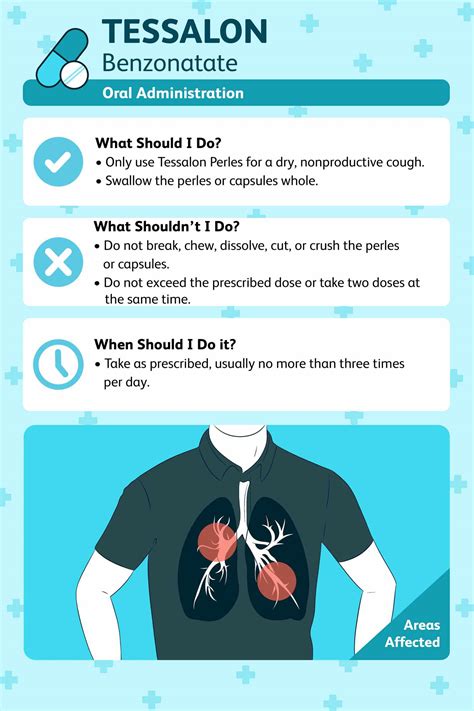Intro
Discover how Benzonatate works to relieve coughs. Learn about its mechanism of action, benefits, and uses in treating coughs associated with colds, flu, and bronchitis. Understand its unique properties as a cough suppressant and how it differs from other cough medications, providing fast and effective relief from persistent coughs.
Coughs can be a real nuisance, disrupting our daily lives and making it difficult to focus on work, sleep, or enjoy social activities. When over-the-counter medications and home remedies fail to provide relief, prescription medications like benzonatate may be prescribed by doctors to help alleviate coughs. But how does benzonatate work, and what are its benefits and potential side effects? In this article, we'll delve into the world of benzonatate, exploring its mechanism of action, uses, and more.

Benzonatate is a prescription medication that belongs to a class of drugs known as antitussives, which are specifically designed to relieve coughs. It works by numbing the throat and lungs, thereby reducing the urge to cough. But how does it achieve this? Let's take a closer look.
How Benzonatate Works
Benzonatate works by blocking the action of certain nerve impulses that trigger coughing. When we cough, it's often in response to irritation or inflammation in the throat or lungs. This irritation stimulates nerve endings, which send signals to the brain, prompting us to cough. Benzonatate works by binding to these nerve endings, effectively numbing them and reducing the transmission of signals to the brain.

By reducing the transmission of these signals, benzonatate decreases the urge to cough, providing relief from persistent and nagging coughs. This makes it an effective treatment for coughs caused by a variety of conditions, including bronchitis, pneumonia, and asthma.
Benefits of Benzonatate
So, what are the benefits of using benzonatate to relieve coughs? Here are some of the advantages of this medication:
- Effective relief: Benzonatate is highly effective in relieving coughs, providing quick and sustained relief from persistent coughing.
- Convenient dosing: Benzonatate is typically taken orally, making it easy to administer and incorporate into your daily routine.
- Low risk of side effects: Compared to other prescription medications, benzonatate has a relatively low risk of side effects, making it a safe option for many patients.

Common Uses of Benzonatate
Benzonatate is commonly prescribed to treat a variety of conditions that cause persistent coughing. Some of the most common uses of benzonatate include:
- Bronchitis: Benzonatate is often prescribed to relieve coughs caused by bronchitis, a condition characterized by inflammation of the bronchial tubes.
- Pneumonia: Benzonatate may be prescribed to alleviate coughs caused by pneumonia, a serious infection of the lungs.
- Asthma: Benzonatate may be used to relieve coughs caused by asthma, a chronic condition characterized by inflammation and constriction of the airways.

Side Effects of Benzonatate
While benzonatate is generally well-tolerated, it can cause some side effects, including:
- Drowsiness: Benzonatate can cause drowsiness and sedation, especially when taken in large doses.
- Dizziness: Some patients may experience dizziness or lightheadedness when taking benzonatate.
- Nausea and vomiting: Benzonatate can cause stomach upset, including nausea and vomiting.

Precautions and Interactions
Before taking benzonatate, it's essential to inform your doctor about any medications you're currently taking, including over-the-counter medications and supplements. Benzonatate can interact with certain medications, including:
- Sedatives: Benzonatate can enhance the effects of sedatives, increasing the risk of drowsiness and sedation.
- Antihistamines: Benzonatate can interact with antihistamines, increasing the risk of drowsiness and sedation.

Conclusion
Benzonatate is a highly effective medication for relieving coughs caused by a variety of conditions. By numbing the throat and lungs, benzonatate reduces the urge to cough, providing quick and sustained relief. While it's generally well-tolerated, benzonatate can cause some side effects, and it's essential to inform your doctor about any medications you're currently taking. If you're struggling with a persistent cough, talk to your doctor about benzonatate – it may be the solution you need to get back to living your life to the fullest.
What is benzonatate used for?
+Benzonatate is used to relieve coughs caused by a variety of conditions, including bronchitis, pneumonia, and asthma.
How does benzonatate work?
+Benzonatate works by blocking the action of certain nerve impulses that trigger coughing, effectively numbing the throat and lungs.
What are the common side effects of benzonatate?
+The common side effects of benzonatate include drowsiness, dizziness, and nausea and vomiting.
